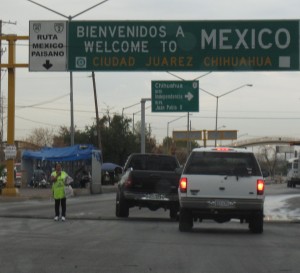
As billions of dollars of legal goods, as well as shipments of drugs and groups of undocumented immigrants continue to cross the U.S. border, immigration reform and border security have become a major topic of discussion. Photo by N. Parish Flannery @LatAmLENS
The immigration debate is under way in the United States. While several prominent Republicans are calling for more focus on border security, Democrats are pushing for a legal pathway to citizenship and a focus on the current reality of the U.S. labor market. In 1970 there were fewer than one million people in the U.S. from Mexico, Honduras, Guatemala, and El Salvador. Now the U.S. is home to more than 14 million people from these countries. In recent decades undocumented immigrants have shifted away from specialization in temporary jobs in agriculture in southwest border states and are settling in a diverse array of cities throughout the country and finding work in a variety of economic sectors. At the same time, in recent years drug cartel related violence has spiked in many northern Mexican cities and illegal drugs and undocumented immigrants continue to pass over the border undetected. The reform debate focuses on updating U.S. legislation to account for the current economic and geopolitical reality.
In 2013 construction, manufacturing, meatpacking, food service, and maintenance are major sectors in the U.S. economy and also important employers of immigrant laborers. In 2012 construction spending in the U.S. totaled $857 billion. Builder Jacobs Engineering reported nearly $11 billion in revenue in 2012 and is poised for strong growth in 2013. Construction and maintenance giant Fluor Corporation reported revenues of $27.6 billion in 2012. Meat producer Tyson Foods reported $33 billion in revenue in fiscal 2012. In the U.S. major businesses have a stake in promoting immigration reform as an economic priority.
Doug Oberhelman, Chairman and CEO of Caterpillar, Inc, an Illinois based company that earned $65.9 billion in revenues in 2012, has emerged as a pro-reform advocate. “Providing consistent, reliable access to both high-skilled and low-skilled talent is critical to sustain our nation’s global competitiveness in many industries including healthcare, technology, manufacturing, hospitality, and tourism. We need reform that will provide opportunities for immigrants and foreign students to enter the U.S. and our workforce legally, attracting and keeping the best, the brightest, and the hard working,” he announced during a recent public event.
In a recent blog, Univision correspondent Fernando Espuelas explains “The Senate bill is a legislative solution that will help grow our economy, create more jobs and bring 11 million people out of the shadows. The bill not only enjoys broad, bipartisan consensus in the Senate, but also has the support of the U.S. Chamber of Commerce and the largest employee unions, while businesses from Silicon Valley to the industrial heartland are clamoring for an immigration system that satisfies the real-world needs of an America with aging demographics and anemic economic growth.”
Facebook empresario Mark Zuckerburg, whose company earned $5.1 billion in revenues in 2012 and donates to both Republicans and Democrats, has emerged as a proponent for immigration reform. “This is something that we believe is really important for the future of our country — and for us to do what’s right,” he said.
The proposed bill, to be successful, will need to balance demands from business owners and economic analysts who argue for new channels for legal immigration with the concerns of voters who are worried about border security. The Senate bill calls for the deployment 20,000 border patrol agents and the construction of 700 miles of fencing, at a cost to taxpayers of around $46 billion.
Raul Labrador, a conservative Puerto Rican Republican congressman from Idaho, has voiced his opinion that “You see all the money we’re spending at the border, and the great job these men and women are doing…and they’re still not stopping all the people coming in.”
Political opponents have called Labrador’s security-focused stance a gimmick designed to derail the debate.
Fernando Mejia, immigrant rights director of the Idaho Communicty Action Network, said “Republican Congressmen are slowly but surely backing a pathway to citizenship – not Rep. Labrador’s extreme political gimmick – for good reason: Citizenship is the only real solution that lives up to our country’s values. Mr. Labrador would do well to visit his own state’s immigrant communities, acknowledge their contributions to society and the economy, and join with his Republican colleagues supporting family unity through a pathway to citizenship.”
President Barack Obama recently explained that ”[he is] absolutely confident that if that [Senate] bill was on the floor of the House, it would pass.”
“The challenge right now is not that there aren’t a majority of House members, just like a majority of Senate members, who [are] prepared to support this bill, the problem is internal Republican caucus politics,” he added.
Although a handful of Republicans continue to call for more fencing and patrolmen, some politicians in Texas wish that people involved in the immigration debate would pay more attention to their views on cross-border commerce and border security issues.
U.S. Congressman Pete Gallego, a Democrat who represents the 23rd district of Texas explained, “Those of us who live along the border want to be just as safe and secure in our beds as anyone else does, but we want a solution that works.”
“We don’t want a political solution, we want a practical solution,” he added.
For many border residents, immigration reform needs to balance security issues with economic reality.
Source Article from http://www.forbes.com/sites/nathanielparishflannery/2013/09/09/immigration-debate-whats-more-important-border-security-or-protecting-immigrant-workers/
Immigration Debate: What's More Important, Border Security Or Protecting Immigrant Workers?
http://www.forbes.com/sites/nathanielparishflannery/2013/09/09/immigration-debate-whats-more-important-border-security-or-protecting-immigrant-workers/
http://news.search.yahoo.com/news/rss?p=immigration
immigration – Yahoo! News Search Results
immigration – Yahoo! News Search Results
